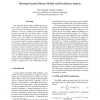Free Online Productivity Tools
i2Speak
i2Symbol
i2OCR
iTex2Img
iWeb2Print
iWeb2Shot
i2Type
iPdf2Split
iPdf2Merge
i2Bopomofo
i2Arabic
i2Style
i2Image
i2PDF
iLatex2Rtf
Sci2ools
114
click to vote
ICPR
2008
IEEE
2008
IEEE
Boosting Gaussian mixture models via discriminant analysis
The Gaussian mixture model (GMM) can approximate arbitrary probability distributions, which makes it a powerful tool for feature representation and classification. However, it suffers from insufficient training data, especially when the feature space is of high dimensionality. In this paper, we present a novel approach to boost the GMMs via discriminant analysis in which the required amount of training data depends only upon the number of classes, regardless of the feature dimension. We demonstrate the effectiveness of the proposed BoostGMM-DA classifier by applying it to the problem of emotion recognition in speech. Our experiment results indicate that significantly higher recognition rates are achieved by the BoostGMM-DA classifier than are achieved by the conventional GMM minimum error rate (MER) classifier under the same training conditions, and that significantly less training data are required for the BoostGMM-DA classifier to yield comparable recognition rates to the GM...
Related Content
| Added | 30 May 2010 |
| Updated | 30 May 2010 |
| Type | Conference |
| Year | 2008 |
| Where | ICPR |
| Authors | Hao Tang, Thomas S. Huang |
Comments (0)

